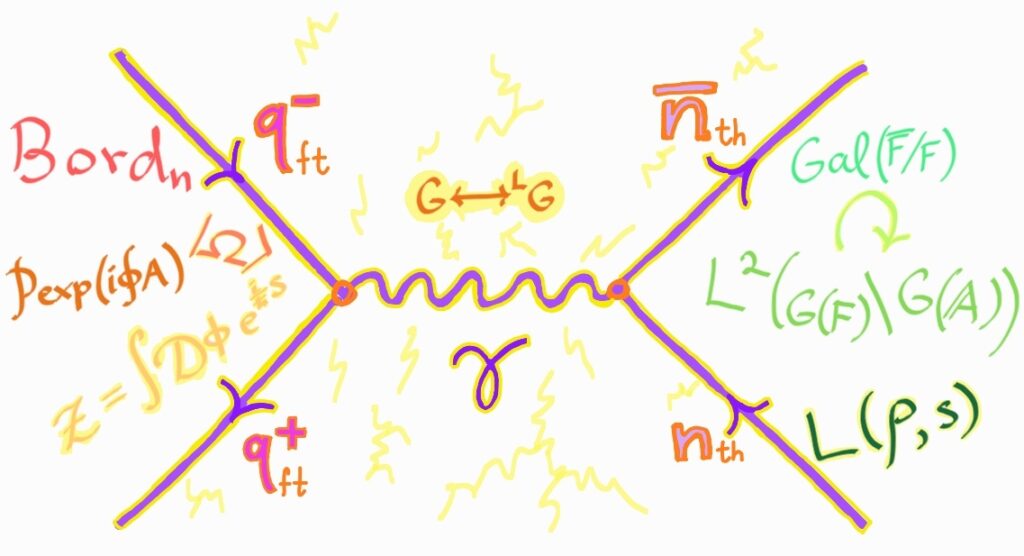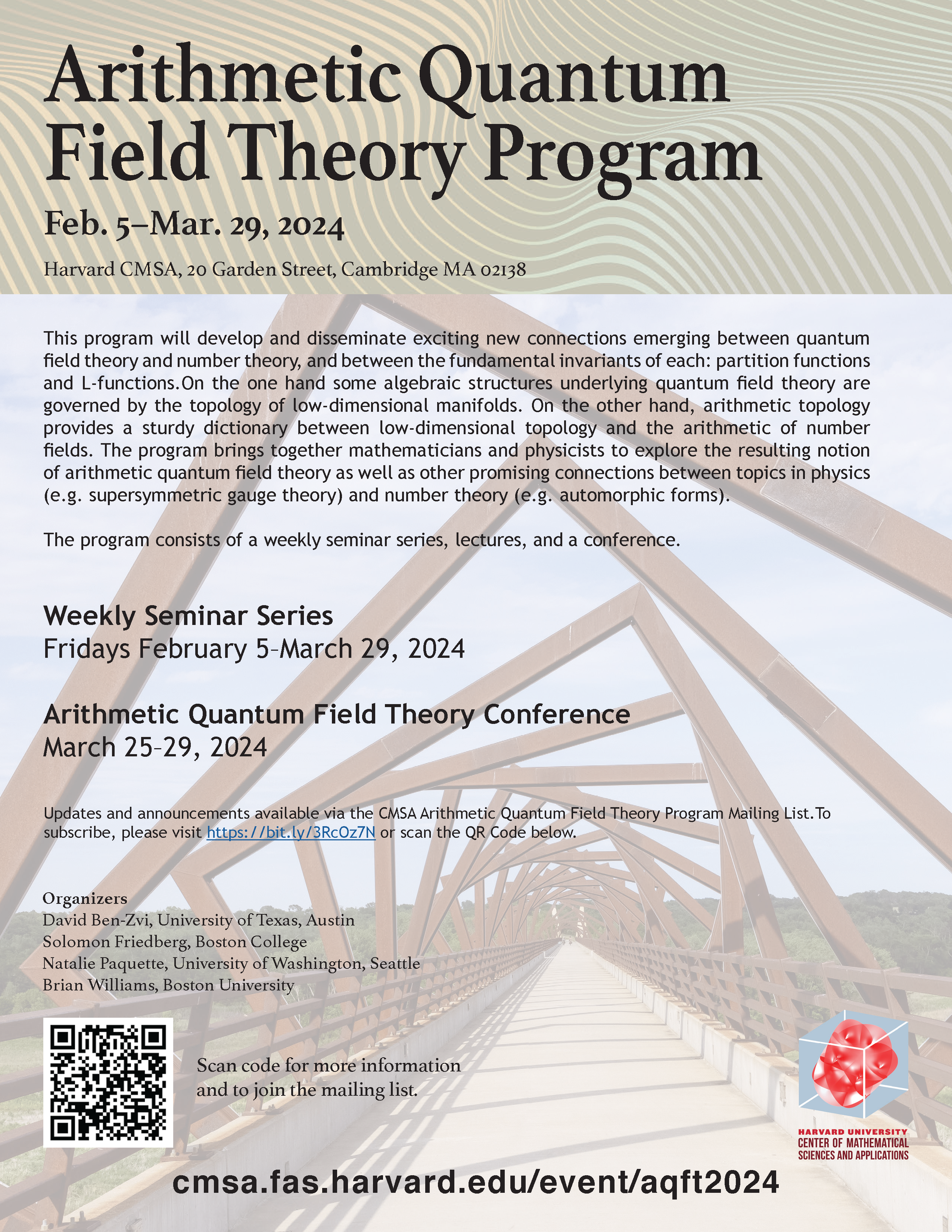Arithmetic Quantum Field Theory Program
To receive email updates and program announcements, visit this link to sign up for the CMSA Arithmetic Quantum Field Theory Program mailing list.
Dates: Feb. 5–Mar. 29, 2024
Location: Harvard CMSA, 20 Garden Street, Cambridge MA 02138
Organizers:
- David Ben-Zvi (University of Texas Austin)
- Solomon Friedberg (Boston College)
- Natalie Paquette (University of Washington Seattle)
- Brian Williams (Boston University)
This program will feature a weekly seminar series, workshops, and a conference.
The object of the program is to develop and disseminate exciting new connections emerging between quantum field theory and algebraic number theory, and in particular between the fundamental invariants of each: partition functions and L-functions.
On one hand, there has been tremendous progress in the past decade in our understanding of the algebraic structures underlying quantum field theory as expressed in terms of the geometry and topology of low-dimensional manifolds, both on the level of states (via the Atiyah-Segal / Baez-Dolan / Lurie formalism of extended, functorial field theory) and on the level of observables (via the Beilinson–Drinfeld / Costello–Gwilliam formalism of factorization algebras). On the other hand, Weil’s Rosetta Stone and the Mazur–Morishita–Kapranov–Reznikov arithmetic topology (the “knots and primes” dictionary) provide a sturdy bridge between the topology of 2- and 3-manifolds and the arithmetic of number fields. Thus, one can now port over quantum field theoretic ideas to number theory, as first proposed by Minhyong Kim with his arithmetic counterpart of Chern-Simons theory. Most recently, the work of Ben-Zvi–Sakellaridis–Venkatesh applies an understanding of the Langlands program as an arithmetic avatar of electric-magnetic duality in four-dimensional gauge theory to reveal a hidden quantum mechanical nature of the theory of $L$-functions.
The program will bring together a wide range of mathematicians and physicists working on adjacent areas to explore the emerging notion of arithmetic quantum field theory as a tool to bring quantum physics to bear on questions of interest for the theory of automorphic forms, harmonic analysis and L-functions. Conversely, we will explore potential geometric and physical consequences of arithmetic ideas, for example, the Langlands correspondence theory of L-functions for 3-manifolds.
Schedule
The first week of the program will feature several lecture series aimed at a broad local community of mathematicians and physicists, aiming to introduce the main ideas underlying our program and help establish a common reference point.
The program will host a weekly seminar series on Fridays.
The speakers will be selected with the aim of covering a wide panorama of the subjects over the course of the program.
The program will conclude with a week-long Conference on Arithmetic Quantum Field Theory March 25–29, 2024.
All lectures take place in Room G10, Harvard CMSA, 20 Garden Street Cambridge.
Week 1: Feb. 5–9, 2024
Abstract: In this lecture series we will introduce some of the themes underlying the CMSA program on Arithmetic Quantum Field Theory taking place this winter and the upcoming conference March 25-29, 2024.
Some of the themes we plan to discuss include:
Structures in QFT (like factorization for observables and functorial QFT for states and their relation to geometric / deformation quantization) that are sufficiently algebraic and formal to allow for arithmetic analogs.
The setup of arithmetic topology as a bridge between the background of QFT to that of arithmetic (both “global” and “local”), including the “middle realm” of positive characteristic function fields.
Questions and structures in arithmetic that have been / might be amenable to inspiration from QFT, in particular the theory of L-functions and the Langlands program.
| Monday, Feb. 5, 2024 | ||
| 11:00 am – 12:00 pm | Minhyong Kim | Arithmetic topology and field theory (Slides part 1 pdf) |
| 1:30 – 2:30 pm | Brian Williams | Algebraic quantum field theory (Lecture Notes) |
| 2:30 – 3:30 pm | David Ben-Zvi | The Langlands program via arithmetic QFT |
| Wednesday, Feb. 7, 2024 | ||
| 11:00 am – 12:00 pm | Minhyong Kim | Arithmetic topology and field theory (Slides part 2 pdf) |
| 2:30 – 3:30 pm | Brian Williams | Algebraic quantum field theory (Lecture Notes) |
| Thursday, Feb.8, 2024 | ||
| 2:30 – 3:30 pm | Minhyong Kim | Arithmetic topology and field theory (Slides part 3 pdf) |
| 4:00 – 5:00 pm | David Ben-Zvi | The Langlands program via arithmetic QFT |
| Friday, Feb. 9, 2024 | ||
| 1:00 – 2:00 pm | Brian Williams | Algebraic quantum field theory (Lecture Notes) |
| 2:00 – 3:00 pm | David Ben-Zvi | The Langlands program via arithmetic QFT |
| 3:30 – 4:30 pm | David Ben-Zvi | The Langlands program via arithmetic QFT |
| Monday, Feb. 26, 2024 | ||
| 1:00 – 2:00 pm | Omer Offen (Brandeis) | Period integrals of automorphic forms and the residue method |
| Tuesday, Feb. 27, 2024 | ||
| 2:00 – 3:00 pm | Wei Zhang (MIT) | Shtuka special cycles and their generating series |
| Friday, March 1, 2024 | ||
| 11:00 am – 12:00 pm | Chen Wan (Rutgers Newark) | Some examples of the relative Langlands duality |
| 2:00 – 3:00 pm | Peng Shan (Tsinghua) | Skein algebras and quantized Coulomb branches |
| Thursday, March 7, 2024 | ||
| 1:30 – 2:30 pm | An Huang (Brandeis) | Tate’s thesis and p-adic strings |
| 3:00 – 4:00 pm | John Francis (Northwestern) | Integrating braided categories over 3-manifolds |
| Friday, March 8, 2024 | ||
| 1:00 – 2:00 pm | Dihua Jiang (U Minnesota) | Shalika Periods: Functoriality and Arithmetic |
| Friday, March 15, 2024 | ||
| 11:45 – 1:00 pm | Baiying Liu (Purdue) | Recent progress on certain problems related to local Arthur packets of classical groups |
| 2:15 – 3:30 pm | Tasho Kaletha (Michigan) | Covers of reductive groups and functoriality |
| Monday, March 18, 2024 | ||
| 1:00 – 3:00 pm | Xinwen Zhu (Stanford) | The tame categorical local Langlands correspondence (Slides) |
| 4:30 – 5:30 pm | Natalie Paquette (U Washington) | Koszul duality & twisted holography for asymptotically flat spacetimes (CMSA) |
| Wednesday, March 20, 2024 | ||
| 11:00 – 12:15 pm | Stephen D. Miller (Rutgers) | What 4-graviton scattering amplitudes had to say about the unitary dual |
| Friday, March 22, 2024 | ||
| 1:45 – 3:00 pm | Jayce Getz (Duke) | The Poisson summation conjecture and the fiber bundle method |
| 3:30 – 4:30 pm | TBA | TBA |
Program Visitors
- Mina Aganagic, University of California, Berkeley
- Anne-Marie Aubert, Institut de Mathématiques de Jussieu-Paris Rive Gauche, March 15-29
- Clark Barwick, University of Edinburgh, February 19-March 15
- Alexander Braverman, Perimeter Institute
- Alejandra Castro, Cambridge University, March 25-29
- YoungJu Choie, Pohang University of Science and Technology, February 12-16; March 22-28
- John Francis, Northwestern University, March 1-14
- David Gaiotto, Perimeter Institute, March 25-29
- Jayce Getz, Duke University, March 18-22
- Ezra Getzler, Northwestern University, March 11-22
- Sam Gunningham, Montana State University, February 9-12
- Sarah Harrison, Northeastern University
- Dihua Jiang, University of Minnesota, February 29-March 9
- Tasho Kaletha, University of Michigan, March 12-20
- Minhyong Kim, University of Edinburgh, February 1-29
- Axel Kleinschmidt, Max Planck Institute for Gravitational Physics, Potsdam, March 18-28
- Kim Klinger-Logan, Kansas State University, March 25-29
- Kobi Kremnitzer, Oxford University, March 25-29
-
Baiying Liu, Purdue University, March 13-16
- Steven Miller, Rutgers University
- Greg Moore, Rutgers University, February 5-9
- David Nadler, University of California, Berkeley, March 17-30
- Bảo Châu Ngô, University of Chicago, March 25-29
- George Pappas, Michigan State University, March 25-29
- Daniel Persson, Chalmers Institute of Technology, March 25-29
- Sam Raskin, Yale University, March 26-29
- Yiannis Sakellaridis, Johns Hopkins University, March 18-22
- Peng Shan, Tsinghua University, February 12-April 14
- Akshay Venkatesh, Institute for Advanced Study
- Roberto Volpato, University of Padova, February 4-10
- Chen Wan, Rutgers University, February 29-March 9
- Fei Yan, Brookhaven National Laboratory, March 18-29
- Xinwen Zhu, Stanford University


